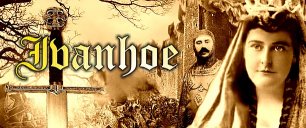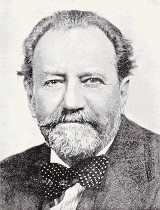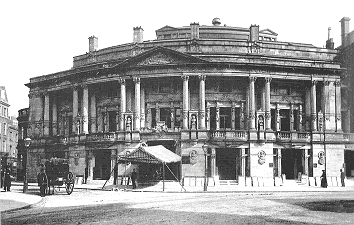 |
|
You are here:
RECOLLECTIONS OF IVANHOE AND OTHER WORKS BY SULLIVAN by Sir Henry J. Wood
Sir Henry J. Wood (1869 - 1944), affectionately known as "Old Timber", rose to fame as co-founder, (with Robert Newman), and chief conductor of the London Promenade concerts, ("The Proms"), between 1895 to 1944. In his early career Wood worked for both Richard D'Oyly Carte and Sir Arthur Sullivan on the original productions of The Yeomen of the Guard and Ivanhoe, as he recalled in his autobiography "My Life of Music", [London; Victor Gollancz Ltd.: 1938.] IX I WORK WITH SULLIVAN - AND OTHERS "IN 1888 I was accompanist for François Cellier's rehearsals in the Savoy Theatre for the Yeomen of the Guard - Sullivan's own favourite opera. He told me he thought it his best. I remember how worried he was over I have a Song to Sing-o. I played several versions of it, none of which satisfied Gilbert, rhythmically, from the point of view of his lyric. Sullivan had been sitting up night after night scoring the whole work and came into rehearsal one morning looking very tired. He put before me the latest version of the number. When I played it Gilbert was delighted with the melody over the drone bass. "The very thing!" he told Sullivan. George Grossmith fell in love with it, too, and we all predicted it would be the most successful number in the opera. I remember how disappointed and hurt Sullivan was when he found the audience talked all through his overture. "I shall never take the trouble to write another," he told me. "Next time I shall get you or Ernest Ford to score a medley of the tunes." I felt sorry for him. One of the worst habits of the British public is this tendency to talk through overtures and entr'actes. This was most evident at the production of Debussy's Pelléas and Mélisande where some of the loveliest music is played between the acts with the curtain down. For this reason that beautiful work will never be popular over here because English audiences will not accept a stage production if they are to keep silence between the acts. It is the same with our orchestras who compare badly with those on the Continent. Abroad, when a section of an orchestra has nothing to do for a few bars, the members listen to what the others are doing and listen with interest and respect. In England they talk if they get a chance. I have often been sorely tried at rehearsals and have had many times to be severe. Still, I will give our orchestras their due: when it comes to the final rehearsal and performance they are unequalled anywhere in the world. To return to Sullivan. I often saw him at Mrs. Ronalds's Sunday afternoon musical At Homes where I shared duties of accompanist with Wilhelm Ganz and Henry Bird. At her house in Cadogan Square every artist of the day was to be seen; indeed, it was a rendezvous for musicians of every nationality. In May, 1890, Sullivan asked me to act as répétiteur for his production of Ivanhoe at D'Oyly Carte's new opera-house in Cambridge Circus. This meant working under François Cellier and Ernest Ford, and being entrusted with the training of Lucille Hill, François Noyes and others for their parts, Sullivan personally paying my fees. A few weeks before the production I was at a rehearsal playing the piano on the prompter's bridge over the orchestra. In the Robin Hood scene there is a recitative accompanied by a tremolo. I hung on to this in the 'till ready' style, and waited for Locksley to begin What folly have we here? Nothing happened. Then some of the chorus pushed forward a big burly fellow. "Go on! It's your part! " He found the middle of the stage and began - a third too high. But he stuck to it, pointing to the castle though keeping his eyes fixed on Sullivan who was in front. After a few bars Sullivan rapped on the stage with his stick. "Who is this man'?" he said to Carte. Carte shook his head. "I don't know." "Do you know him?" This to Cellier. "Never seen him before." Sullivan grunted. "Do you know him, Mr. Wood?" "No, sir!" "I suppose Mrs. Carte must have engaged him," mused Sullivan. "Will somebody have the goodness to find her?" Mrs. Carte came on stage and there was a whispered conference, the unknown singer watching the proceedings with interest. "Strike this scene!" commanded Sullivan. "We'll get on with the next act." He then turned to me. "Take this fellow home with you this evening," he said. "Give him all the time you can, and for goodness' sake loosen his throaty production. Make him put some inflection into his recitatives - and teach him his part. He doesn't know it." The singer proved to be a man named William Stevens, a young Cornish tenor. His self-esteem received a rude shock, for he was easily the most conceited individual I ever met in the profession. Even so, Sullivan paid for him to continue his lessons with me. But we never found out who gave him the engagement. This meeting with Stevens, however, had a wonderful sequel for me. He brought to my studio the Princess Olga Ouroussoff who wished to take singing lessons. Her coming indeed marked a milestone in my life for, later, she was to become my wife. It may be remembered that Ffrangçon-Davies began his career in the Church but later became one of England's really great singers. He provided an amusing incident during the run of Ivanhoe in which he took the part of Cedric the Saxon. After the opera had been running a few weeks and he had become well installed in his part, he danced on in the tournament scene one night in a strangely frisky manner, making comic asides to the evident amusement of the chorus ladies whom he insisted on chucking under the chin. He had obviously dined well rather than wisely; but, as there was no understudy in the theatre he had to go through with it, despite the titterings of the audience. The next morning, he was summoned before the management. I shall never forget the superb aplomb with which he walked on to the stage to face Sullivan, Carte, Cellier and myself. "Good morning, gentlemen!" he said breezily. "This is an unexpected pleasure." Carte nudged Sullivan and Sullivan nudged Cellier and CelIier nudged me. Carte then opened fire. "Er . . . we had to send for you this morning, Mr. Ffrangçon-Davies, because of the somewhat extraordinary performance you gave last night. Perhaps you can explain matters?" Ffrangçon beamed. "Quite easily," he said, "quite easily. You see, gentlemen, my wife was sitting in the stalls. I was so nervous that I had to take a restorative." Carte had nothing to say. Nor had anyone else. At last: "Er . . . thank you, Mr. Davies. Good morning!" Thus ended the interview with the still breezy Ffrangçon. My association with Sullivan was very happy, and the production of Ivanhoe sealed a long friendship. Probably the public had never seen grand opera so superbly mounted or so splendidly stage-managed - the credit for which goes to Hugh Moss. Undoubtedly the principals and chorus were the finest obtainable. Ivanhoe contains great moments, even if there are too many scenes. If D'Oyly Carte had had a repertory of six operas instead of only one, I believe he would have established English opera in London for all time. Towards the end of the run of Ivanhoe I was already preparing the Flying Dutchman with Eugène Oudin in the name part. He would have been superb. However, plans were altered and the Dutchman was shelved. Among many letters Sullivan wrote me, the following illustrates the charming simplicity of the man -although I was so much his junior, he could seek my advice - "I am again conducting the B Minor Mass. You know your Bach well. Tell me! How is it that half-way through this superb work I feel everybody becomes bored and sick of it?" "In my opinion," I replied, "it is because twelve double-basses are sawing away for two and a half hours without cessation. I suggest you look through the bass part. Wherever possible - in the arias and duets especially - rest the basses and let the 'cellos become the eight-feet bass. I have learned this from the great organists who never pedal continuously throughout a service. I suffer as much as you do from too much sixteen-feet bass (and the first violins) in choral performances of Bach and Handel." This letter to Sullivan foreshadowed my ceaseless endeavour to balance tone between chorus and orchestra; hence my re-scoring of Handel in the Messiah, Solomon, and Samson, and of Bach in the Mass, the Matthew Passion, and over sixty of the cantatas. The 'let-us-have-it-as-written' doctrine (as preached by a certain set) is, in my view, wrong. We can never afford to do without the interpretative artist. " [pp. 39 - 43] MISCELLANEOUS REFERENCES TO SULLIVAN The following random reminiscences of Sullivan and his works appear throughout Sir Henry J. Wood's autobiography, mainly in relation to performances given during the London Promenade concert seasons at the Queen's Hall. "I wonder whether we could fill Queen's Hall in these days with a Sullivan concert! I doubt it; but we did it in 1895." [page 80] In May of 1899, Wood opened the London Music Festival with the Queen's Hall Orchestra in works by Beethoven, Wagner, Tchaikovsky, Coleridge-Taylor and Sullivan. [noted on page 125] "This season the Nottingham Sacred Harmonic Society was steadily improving. We gave a splendid performance of Sullivan's Martyr of Antioch on February 9 [1899] with a fine cast of singers including Esther Palliser, Ada Crossley, Lloyd Chandos, W. A. Peterkin and Robert Radford." [page 138] "Thinking of [famed pianist] Busoni reminds me of dear old Sullivan because, at the same concert [on 24 November, 1900], I opened with Wagner's Trauermarsch in his memory. He had died only two days previously. I was very sad because he had always been my musical mascot. He had so often dropped in for a chat during concert intervals. I remember him asking me which work of Tchaikovsky he should direct at a forthcoming Leeds festival. I suggested the fifth symphony, and still have a delightful letter from him on the subject. "If you will promise to play this for me one night at the Promenade concerts," he wrote, "when I can come and hear it just before the Leeds Festival, I will direct it." I arranged this just before he began his rehearsals. It was indeed a performance 'by request', but the public never knew it. After this performance he wrote me the following letter, which I greatly prize: 1, QUEEN'S MANSIONS, VICTORIA STREET, S.W. Sept. 4, 1898. DEAR MR. WOOD, I have a fairly long experience of orchestral playing and orchestral conducting, and I say quite sincerely that I have never heard a finer performance in England than that of the Tchaikovsky Symphony under your direction last Wednesday. It was a perfect delight to listen to such accent, phrasing, delicacy and force, and I congratulate both the gifted conductor, and the splendid orchestra. And what a lovely work it is! I could see that you and the band, too, revelled in bringing out its beauties. Forgive me this little outburst of honest admiration, and believe me. Yours sincerely, ARTHUR SULLIVAN. After the festival was over he wrote to me again and told me what a success it had been, and how he wished I could have missed a concert and gone up to hear it." [pp. 142 - 3] "During the following week [in September 1901] we gave an evening to Sullivan's music - both parts of the programme. Our list of works included a Processional March, overture In Memoriam, incidental music to the Tempest, overture Di Ballo, incidental music to Henry VIII, overture Macbeth, masque music from the Merchant of Venice, and the Fantasia from H.M.S. Pinafore. Such a programme makes strange reading in these days when Sullivan is chiefly remembered by the Savoy Operas. As a matter of fact we did include a few solos from Ivanhoe and the light operas, not even disdaining a couple of quartets from the Mikado and one from the Yeomen of the Guard. Our four singers, by the way, were Florence Schmidt, Lloyd Chandos, Kirkby Lunn and W. A. Peterkin." [page 151] "…on November 22 [1901] we gave a memorial concert to Sullivan (whose death had occurred on that date the previous year) with a programme including the Golden Legend with [Lillian] Blauvelt, Kirkby Lunn, John Coates and Ffrangçon-Davies, bringing up the Wolverhampton Choral Society for the choral parts." [page 155]
Queen's Hall, Langham Place, London - built in 1893 and venue of the Henry Wood Promenade
concerts with the Queen's Hall Orchestra Page created 3 October 2003 |

